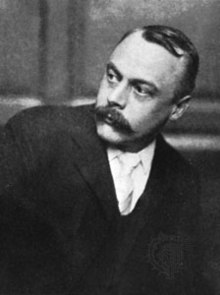Kenneth Grahame
Kenneth Grahame (8 mars 1859 à Édimbourg - 6 juillet 1932 à Pangbourne dans le comté de Berkshire) est un romancier britannique. Il est principalement connu pour son roman Le Vent dans les saules (The Wind in the Willows, 1908), un classique de la littérature pour enfants.

Le Dragon récalcitrant (dans Dream Days, 1898)
modifier- (en) Look here, father, you know we've each of us got our line. You know about sheep, and weather, and things; I know about dragons. I always said, you know, that that cave up there was a dragon-cave. I always said it must have belonged to a dragon some time, and ought to belong to a dragon now, if rules count for anything. Well, now you tell me it has got a dragon, and so that's all right. I'm not half as much surprised as when you told me it hadn't got a dragon. Rules always come right if you wait quietly.
- Dream Days (1898), Kenneth Grahame (trad. Wikiquote), éd. John Lane, 1902, The Reluctant Dragon, p. 160
- (en) None of my books ever told me that dragons purred!
- Dream Days (1898), Kenneth Grahame (trad. Wikiquote), éd. John Lane, 1902, The Reluctant Dragon, p. 162
L'Âge d'or, 1904
modifier- (en) As a rule, indeed, grown-up people are fairly correct on matters of fact; it is in the higher gift of imagination that they are so sadly to seek.
- The Golden Age, Kenneth Grahame (trad. Wikiquote), éd. John Lane, 1904, The Finding of the Princess, p. 62
- (en) like the monkeys, who very sensibly refrain from speech lest they should be set to earn their livings
- The Golden Age, Kenneth Grahame (trad. Wikiquote), éd. John Lane, 1904, Lusisti satis, p. 239
Le Vent dans les saules, 1908
modifier- (en) The Mole had been working very hard all the morning, spring-cleaning his little home. First with brooms, then with dusters; then on ladders and steps and chairs, with a brush and a pail of whitewash; till he had dust in his throat and eyes, and splashes of white-wash all over his black fur, and an aching back and weary arms. Spring was moving in the air above and in the earth below and around him, penetrating even his dark and lowly little house with its spirit of divine discontent and longing.
- Premières phrases du roman.
- The Wind in the Willows, Kenneth Grahame (trad. Wikiquote), éd. Charles Scribner's sons, 1908, Chapter 1. The River Bank, p. 1
- (en) 'Beyond the Wild Wood comes the Wide World,' said the Rat. 'And that's something that doesn't matter, either to you or me. I've never been there, and I'm never going, nor you either, if you've got any sense at all. Don't ever refer to it again, please.
- The Wind in the Willows, Kenneth Grahame (trad. Wikiquote), éd. Charles Scribner's sons, 1908, Chapter 1. The River Bank, p. 12
Le Blaireau pénétra dans la pièce d'un pas lourd, et se campa là à regarder les deux animaux avec une expression pleine de sérieux. Le Rat laissa la cuillère de son œuf tomber sur la nappe et resta assis bouche bée.
"L'heure est venue !" dit enfin le Blaireau avec beaucoup de solennité.
"Quelle heure ?", demanda le Rat, mal à l'aise, en jetant un œil à l'horloge sur la cheminée.
"L'heure de qui, tu devrais dire", répliqua le Blaireau. "Voyons, l'heure de Crapaud ! L'heure de Crapaud a sonné ! J'ai dit que je le prendrais en main dès que l'hiver serait terminé, et je vais le prendre en main aujourd'hui !"
"L'heure de Crapaud, bien sûr !" s'écria la Taupe avec allégresse. "Hourra ! Je m'en souviens maintenant ! Nous allons lui apprendre, nous, à se montrer un Crapaud raisonnable !"
- (en)
The Badger strode heavily into the room, and stood looking at the two animals with an expression full of seriousness. The Rat let his egg-spoon fall on the table-cloth, and sat open-mouthed.
'The hour has come!' said the Badger at last with great solemnity.
'What hour?' asked the Rat uneasily, glancing at the clock on the mantelpiece.
'Whose hour, you should rather say,' replied the Badger. 'Why, Toad's hour! The hour of Toad! I said I would take him in hand as soon as the winter was well over, and I'm going to take him in hand to-day!'
'Toad's hour, of course!' cried the Mole delightedly. 'Hooray! I remember now! We’ll teach him to be a sensible Toad!'
- The Wind in the Willows, Kenneth Grahame (trad. Wikiquote), éd. Charles Scribner's sons, 1908, Chapter 6. Mr. Toad, p. 121-122
Articles connexes
modifier- Lyman Frank Baum, autre auteur de fantasy pour la jeunesse du début du XXe siècle